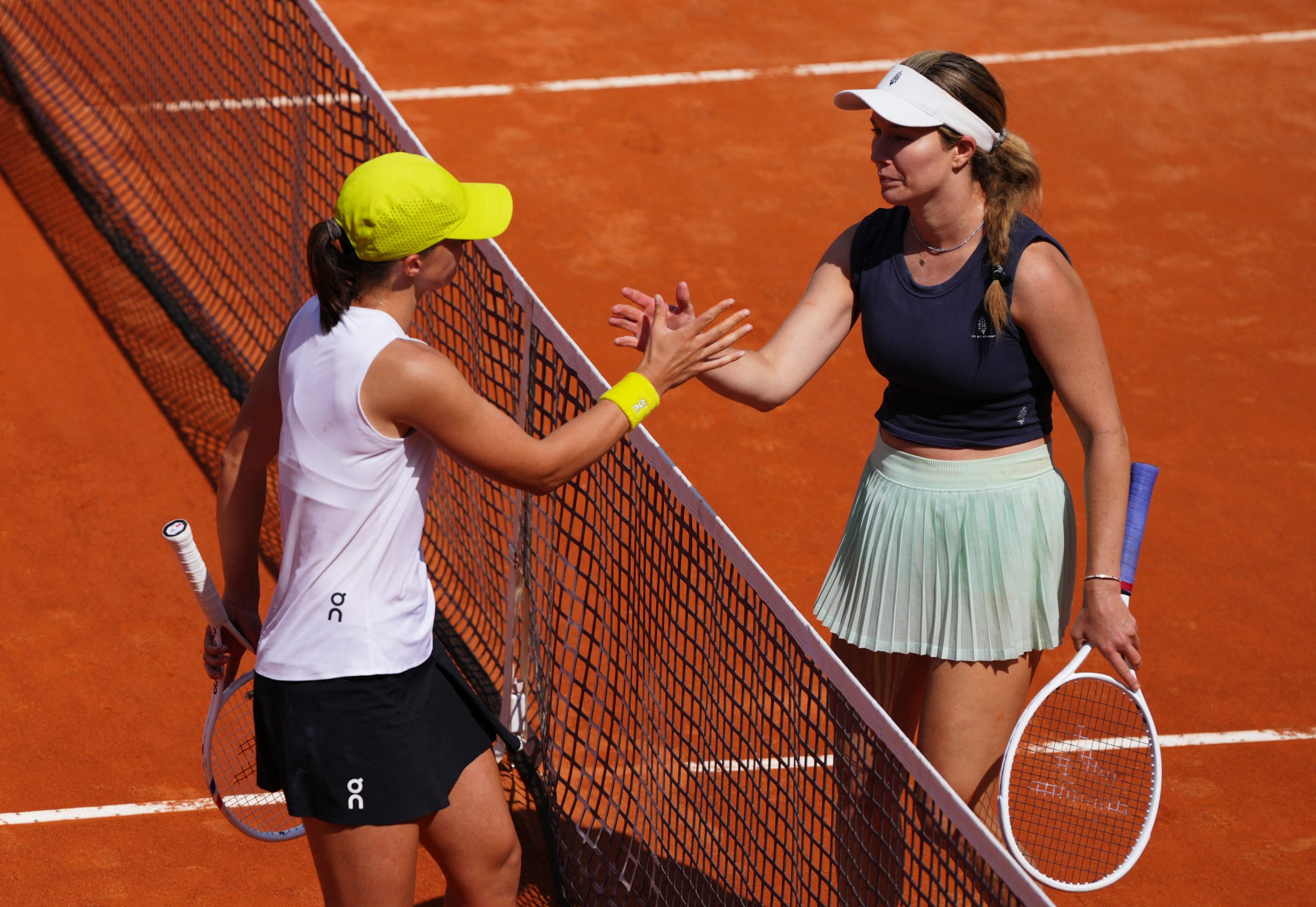In the Eternal City, where ancient ruins whisper tales of gladiators and empires, a new kind of conquest unfolded on the clay courts of the Foro Italico. In a result few predicted but many will remember, Danielle Collins defeated Iga Swiatek—the reigning queen of clay and defending champion of the Italian Open—with a brand of tennis that was nothing short of fearless.
As the Roman sun dipped behind the Stadio Centrale, it wasn’t just a match that ended. It was a seismic shift. For Collins, a player often seen as a dark horse in the draw, this was a coronation of sorts—validation for years of grit, pain, comeback, and now, supreme execution.
Let’s unpack how one of the boldest shot-makers in tennis delivered the upset of the 2025 season—and what this means for the WTA landscape.
🧨 The Shock Heard Around the Tennis World
Danielle Collins is no stranger to high-pressure moments. From her breakout performance at the 2019 Australian Open to her finals run in 2022, she has always been a competitor with a bite. But beating Iga Swiatek in Rome? That’s like toppling Caesar in his own Senate.
Swiatek had been nearly untouchable on clay, especially in Rome, where she had won three of the last four titles. Her heavy topspin forehand, relentless footwork, and mental poise had suffocated opponents. She was, in a word, dominant. So when Collins stepped onto the court, few thought she could overpower the Polish phenom.
But Collins didn’t just overpower her. She outplayed her.
Right from the opening game, Collins brought the thunder—crushing returns, flat winners, and aggressive net play. There was a swagger in her step, a glint in her eye. Swiatek, visibly rattled, tried to extend points, hoping Collins would blink.
She never did.
🔥 Playing on Her Own Terms
One of the most remarkable things about Danielle Collins’ defeat of Iga Swiatek was that she never abandoned her identity. Collins has always been a first-strike player, someone who doesn’t just wait for chances—she demands them.
She hit down the line with audacity. She took Swiatek’s second serve early. She neutralized Iga’s looping topspin with pace and precision. In effect, she took away the time Swiatek usually uses to construct her points.

And perhaps most critically—she didn’t flinch.
Even when Swiatek clawed back a break in the second set and the crowd grew louder with each point, Collins didn’t retreat. She amped up the aggression, ending the match on a blistering backhand winner that painted the sideline like a masterpiece in motion.
It wasn’t luck. It was legacy-making tennis.
🧠 The Mind Behind the Muscle
Fearless hitting is only effective when paired with tactical intelligence, and Collins delivered both.
What she did so well was identify the small cracks in Swiatek’s armor—and drill into them with surgical precision:
- Targeting the backhand side: Though Swiatek’s backhand is solid, it lacks the same bite as her forehand. Collins continuously went there with depth and flat pace.
- Shortening the points: Rather than getting lured into long rallies, Collins cut points short with early ball striking. This robbed Swiatek of rhythm.
- Attacking second serves: Swiatek’s second serve has long been the weakest link in her game. Collins made her pay, winning over 60% of those points.
It was a tactical masterclass wrapped in the aggression of a warrior.
🌪️ Emotional Fire and Ice
Collins’ emotional transparency has always been part of her on-court identity. She fist-pumps. She shouts. She feels the match in real time. And in this match, that energy was her weapon.
In contrast, Swiatek—usually composed and serene—was visibly shaken. She double-faulted at key moments, missed routine forehands, and questioned her choices. For once, she looked beatable. For once, someone stood toe-to-toe and stared her down.
That someone was Danielle Collins.
Her emotional fire wasn’t a distraction—it was fuel. She rode that wave with balance, never tipping into chaos, using the crowd and momentum to elevate her game to stratospheric heights.
📈 A Changing of the Guard?
Now the WTA is buzzing with one question: Is this just a one-off upset, or a turning point?
Collins, at 31, has already announced that this season will be her last on tour. And yet, she’s playing the best tennis of her career. Her movement is sharp, her body strong, and her mind dialed in. She’s playing with freedom—the kind that comes when nothing is left to prove.
Meanwhile, Swiatek remains the top-ranked player in the world. This defeat doesn’t undo her dominance, but it exposes that even the best have vulnerabilities. It’s a reminder that in women’s tennis, power, belief, and momentum can shift at any moment.
We may be witnessing a generational overlap: Swiatek, the methodical maestro, meeting her match in a veteran playing the tennis of her life.
📸 The Viral Moment: One Point to Rule Them All
Every great match has that point—the one that gets replayed on social media and burned into our collective memory.
Midway through the second set, with Swiatek pressing, Collins chased down a drop shot, whipped a running forehand up the line, and followed it with a reflex volley that stunned even the commentary box.
It wasn’t just about athleticism. It was art. Tennis distilled into raw, explosive emotion.
That point, that celebration, that energy—it was Collins’ moment of immortality. A symbol of everything she brought to that court. And why this win meant more than just a place in the semifinals.
🌍 The Fans React: A Global Shockwave
Twitter exploded. Reddit went into analysis overdrive. Former pros chimed in, calling it “one of the gutsiest performances” they’d seen on clay in years. Fans around the world, from New York to Nairobi, felt the magnitude of the upset.
Swiatek, humble in defeat, acknowledged Collins’ brilliance in her post-match interview: “She played lights-out tennis. I gave my best, but today wasn’t my day.”
That’s the thing about tennis. It doesn’t always go by rankings or history. On the right day, with the right belief, anything can happen. And Rome bore witness.
🎾 What’s Next for Danielle Collins?
For Collins, the victory is more than symbolic. It positions her as a real threat for Roland Garros. With the clay game finely tuned and confidence soaring, she suddenly becomes a player no seed wants to see in their section.
It also casts her farewell tour in a different light. No longer just a sentimental journey, it’s now a campaign for glory. A player who said she wanted to leave on her own terms now has the chance to do so with a trophy in her arms and a roar in her heart.
And if she can beat the world No. 1 on her best surface? Well, who’s to say she can’t go all the way?

💬 Final Thoughts: When Power Meets Purpose
Danielle Collins’ defeat of Iga Swiatek in Rome is more than a headline—it’s a case study in courage.
It’s what happens when a player trusts their game unconditionally, when experience meets opportunity, and when fearlessness becomes fate.
For Swiatek, it’s a lesson. For Collins, it’s a triumph. And for tennis fans? It’s a reminder that the sport remains one of the most electrifying, unpredictable, and beautiful battlegrounds in the world.
Because in tennis, just like in Rome’s storied history, empires can fall—and legends can rise—in a single afternoon.


